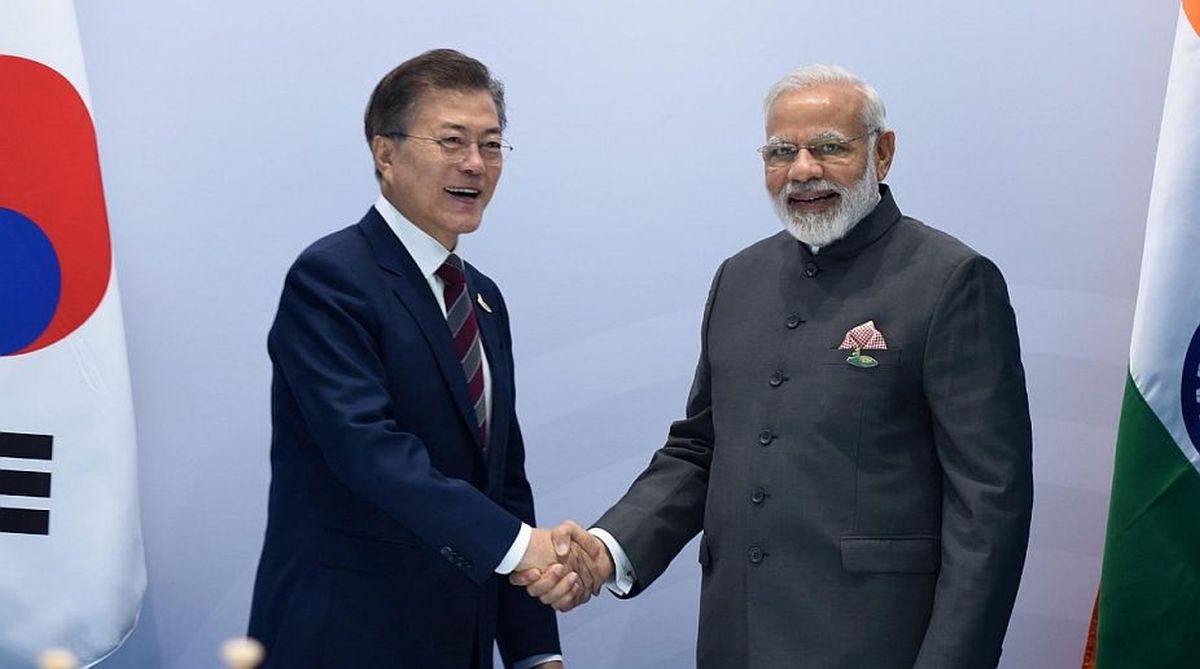Assam’s grand Jhumoir show: 8,000 performers, PM Modi to attend
Assam’s Jhumoir Binandini event on February 24 will feature over 8,000 performers showcasing the traditional Jhumoir dance at Sarusajai Stadium, Guwahati.

PM Narendra Modi with South Korean President Moon Jae-in (PHOTO: Twitter)
Prime Minister of India Narendra Modi on Tuesday strongly backed South Korean President Moon Jae-in’s efforts aimed at complete denuclearisation of the Korean Peninsula as their two countries signed 11 accords in diverse fields and pledged to take bilateral trade to $50 billion by 2030 from the current $20 billion.
The South Korean leader, who is on a four-day State visit to India, held wide-ranging talks with PM Modi on bilateral issues as well as global developments. Official sources indicated that they spent considerable time discussing the situation in the Korean Peninsula following the recent Inter-Korea summit and the US-North Korea summit.
Advertisement
“We hope that these developments will contribute to complete denuclearisation as well as lasting peace and stability in the Korean Peninsula. We pledged to work together to prevent the proliferation of weapons of mass destruction and delivery systems, particularly to terrorists and non-state actors,’’ said a ‘Vision Document’ titled “People, Prosperity, Peace and our Future” adopted by the two leaders.
Advertisement
Modi said the entire credit for accelerating the peace process in the peninsula went to President Moon even as he indirectly referred to the proliferation linkages between North Korea and Pakistan. “Therefore, India is also a stakeholder in the success of this peace,’’ he told the visiting leader.
On his part, President Moon briefed the Indian leader on the situation in the peninsula and expressed his gratitude to India for its unfailing support to the peace process. “There will be bumps and grooves in the road (to peace) but I am confident about the outcome,’’ he is believed to have told PM Modi.
Briefing reporters on the meeting between the two leaders, Preeti Saran, Secretary (East) in the External Affairs Ministry said among the 11 accords that the two countries had signed, one was related to an early harvest package of the upgraded Comprehensive Economic Partnership Agreement (CEPA). The other accords were in areas like healthcare, cutting edge technology, cultural exchange, science and technology, railway research and small and medium enterprises.
The two leaders also discussed bilateral defence cooperation at length. Modi invited Korean companies to invest in the defence sector under the ‘Make in India’ programme.
The ‘Vision Document’ said the two countries would enhance military exchanges, training and experience-sharing and research and development, including innovative technologies for mutual benefit. Both Modi and President Moon recognised the important role their two countries played in ensuring peace and stability in the region, including India’s historic association with peace efforts following the Korean War.
In an apparent reference to China’s aggressive policy on matters pertaining to the South China Sea, the two leaders reaffirmed the importance of freedom of navigation, overflight and unimpeded lawful commerce. They supported initiatives for peaceful resolution of conflicts through dialogue.
The two leaders recognised the threat emanating from terrorism, violent extremism and radicalisation and vowed to combat these evils through coordinated regional and global efforts.
South Korea, a member of the Nuclear Suppliers’ Group (NSG), supported India’s inclusion in the global nuclear cartel. The two countries also agreed to explore a tripartite partnership for development in third countries, beginning with capacity-building programmes in Afghanistan.
Advertisement